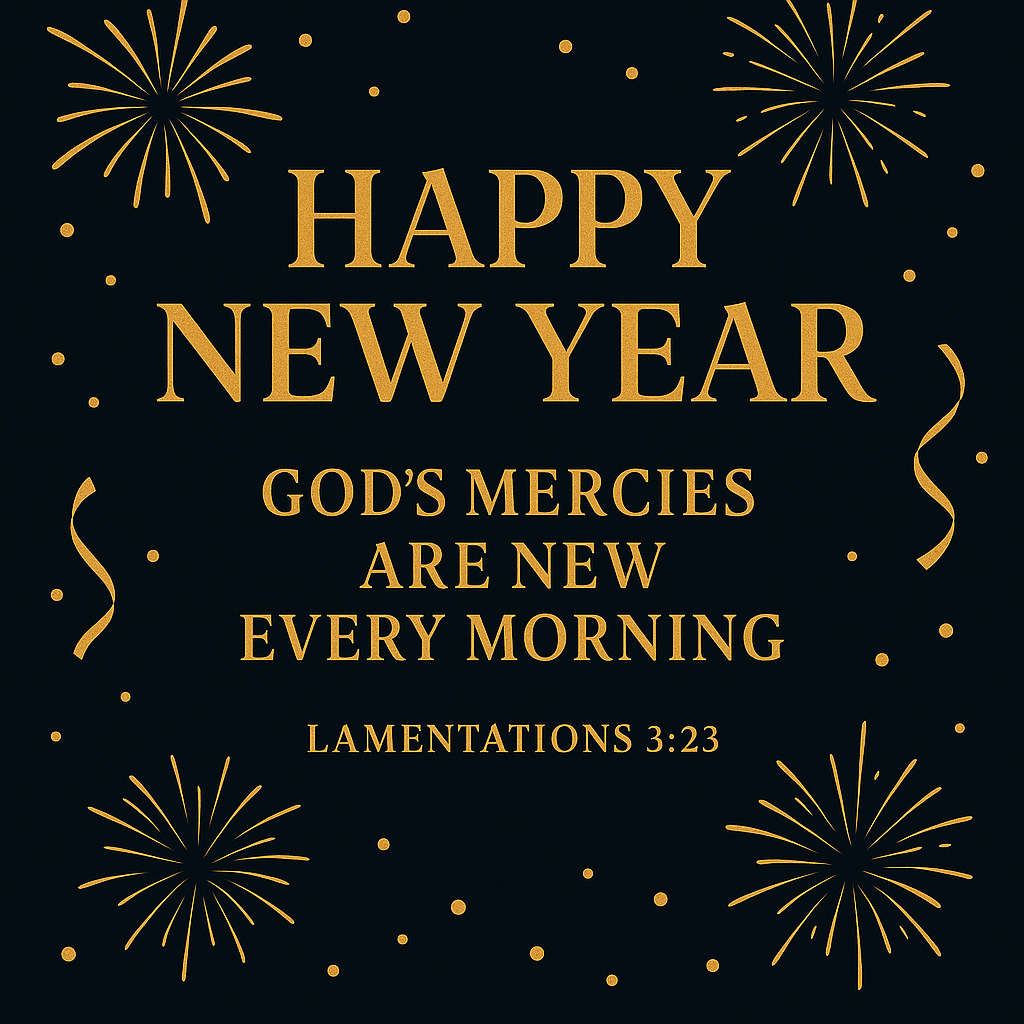Every New Year’s Day, throngs of people make resolutions for the new year, and then within the first month, they abandon them. So, what is the point? Why should Christians participate in the celebration? And what are the origins of New Year's Day, anyway—are they consistent with the Christian life?
The answer lies in the reason we celebrate and what we are reflecting on for the new year ahead. The world is focused on self-improvement and self-help, but the Bible teaches us to be dependent on God and that the Holy Spirit will work through us to help us become who we were meant to be in Christ. Understanding how New Year's Day has developed and what the Bible has to say about resolutions and reflections can help us decide how we should celebrate the season.
What Is the History of New Year’s Day?
According to Britannica, the earliest celebration of the New Year was recorded in Mesopotamia in 2,000 BCE with the first new moon after the vernal equinox. Other areas identified and observed the New Year by the first new moon after the autumn equinox, while others set it on the vernal equinox, autumn equinox, or winter solstice. It wasn’t until 153 BCE that the official date became January 1st. Christian Europe considered March 25, the Feast of the Annunciation, as the beginning of the new year, but the Gregorian calendar (1582) restored January 1st as New Year’s Day. Some religions follow the lunar calendar and celebrate on other days.
Most cultural customs note the passing of time by looking back and looking forward with a sense of both regret and anticipation. The practice of making resolutions dates back as early as the Babylonians. “Auld Lang Syne,” a Scottish ballad taken from a poem by Robert Burns, is often sung at the turning of midnight on New Year’s Eve. There are also varied symbolic foods, including the southern tradition of eating black-eyed peas for good luck.
Modern additions to New Year’s Day celebrations include public celebrations, like the dropping of the ball in Times Square in New York City, and sporting events like the Rose Bowl with the accompanying parades. Many people attend parties on New Year’s Eve and then sleep in and rest on New Year’s Day itself. Others meet with friends for food and games.
Should Christians Make Resolutions? Are They Biblical?
What exactly is a resolution? According to Merriam-Webster, a resolution is the act or process of resolving, or something that is resolved. In the Bible, Strong’s Concordance lists 1013 – bouléma as a resolve of purpose or will. So, resolutions are not limited to just a holiday tradition that is soon forgotten.
Those who follow Christ may wonder whether resolutions are biblical. In his article on Christians and New Year’s resolutions, Britt Mooney offers a biblical framework for making resolutions.
"Since the New Year’s resolution arises from a desire for change, the Bible addresses the need for our transformation...Our transformation, however, doesn’t come from a simple resolution but an ongoing renewing of our whole thinking, trusting more on the Spirit and less on ourselves, which becomes the danger of resolutions."
James Spencer also discusses resolutions by suggesting a shift in thinking that aligns with God’s will. It all boils down to a resolve to be obedient to the will of God and to resolve to be more like Christ each day. The main difference between Christian resolve and worldly resolutions is the emphasis on self versus the emphasis on the Holy Spirit working in us.
Christian resolve should be a daily activity. Romans 12:2 tells us that we shouldn’t be conformed to the world, but we should be transformed by renewing our minds. Every day we must focus on being obedient to God’s word and aligning our thoughts and actions to His will. It is something we should do every day. However, New Year’s Day is a good time to reflect on what God has done for us in the past year and to ask God what we need to work on in the coming year.
What Are Some Christian Traditions and Ideas for the New Year?
New Year’s Day is a great time for reflection, confession, and renewal. While celebrating with friends and family is always a good way to connect, we also need to take some time alone to commune with Our Father in Heaven. Communication involves speaking from the heart, but it also requires listening. Some of the best ideas I have found for the holiday involve introspection and resolution. Below are some ideas that will hopefully inspire you as you seek to start the New Year with a Godly focus:
- One idea is to create a gratitude/beautiful moments jar.
During the year, when something happens to brighten your day, like an unexpected gift or visit or a beautiful rainbow, jot it down on a card and put it into the jar. When you are having a hard day or going through a challenge, open the jar and read a few. On New Year’s Day, go through the beautiful moments and thank God for all the little things he did all year. Then, reset the jar and begin again.
- Another popular tradition is to choose a word and/or scripture for the coming year.
Take some time to meditate on scripture and pray in the week(s) before New Year’s Day, asking God what he wants you to focus on in the coming year. This year, God gave me the phrase “moving forward in hope” because I am still coming out of a challenging season. The scripture is Philippians 3:13: “Brethren, I do not count myself to have apprehended; but one thing I do, forgetting those things which are behind and reaching forward to those things which are ahead.”
- Maybe you should simply take your journal and Bible to a quiet place and write down what is on your heart, read the scriptures, and pray for God to speak.
Write down anything you feel the Holy Spirit saying to you. Take a moment to reflect on the year and make a list of things you are grateful for from the last year. Gratitude is a great way to start the new year.

Scripture Readings and Prayers for the New Year
The Bible is full of verses and prayers related to starting a new year, like 40 verses for this year, verses to inspire, and verses for renewal. The following are a few examples of how to pray the scriptures over the new year.
1. I resolve to have a clean heart.
Psalm 139:23-24 - “Search me, O God, and know my heart; Try me, and know my anxieties; And see if there is any wicked way in me, and lead me in the way everlasting.”
God, I want to start the year fresh. Search me, know me, and try me. You know my anxieties, and you know my weaknesses. Forgive me where I have sinned. Show me where I need to be alert. I need the strength and wisdom of the Holy Spirit to guide me day by day in the coming year. Amen.
2. I resolve to let go of the past and move forward in Christ.
Philippians 3:13-14- “Brethren, I do not count myself to have apprehended; but one thing I do, forgetting those things which are behind and reaching forward to those things which are ahead, I press toward the goal for the prize of the upward call of God in Christ Jesus.”
God, I want to let go of the things that are holding me down so that I can move forward this year with you. Show me what I need to let go of and help me to daily resolve to release whatever it may be. Help me focus on the goal of being more like Your Son every day of the coming year. Amen.
3. I resolve to not rely on past victories but continue to grow in grace.
Isaiah 43:18-19 – “Do not remember the former things, nor consider the things of old. Behold, I will do a new thing, now it shall spring forth; Shall you not know it? I will even make a road in the wilderness and rivers in the desert.”
God, help me look forward to what you are doing now and not to rely on old habits as I move into the new year. Help me to see where you are at work and to join you in obedience. Help me to not rest on past accomplishments and victories but to always seek to grow in grace and faith in the coming year. Amen.
4. I resolve to trust God and follow the paths He shows me.
Proverbs 3:5-7 – “Trust in the Lord with all your heart, and lean not on your own understanding; In all your ways acknowledge Him, And He shall direct your paths.”
God, help me trust you more and rely on myself less. Help me to do all things for your glory and not my own. Show me the paths I should take in the coming year. Amen.
Conclusion: Walking into the New Year with Christ
Any day is a good day to reflect on what God has done, to confess our sins, and to draw closer to God. New Year’s Day is just a great opportunity to do that on a larger scale as we look back at the year that has past and look forward to the new one ahead.
God will forgive us for our past if we confess and repent (1 John 1:9; 2 Chronicles 7:14). He will also go before us into the new year (Deuteronomy 31:8). God has been faithful and will continue to be faithful because he never changes (Lamentations 3:22-24). So, take a moment on New Year’s Day to thank God and pray for guidance as we step into the new year. I can think of no better way to step into the unknown future than walking into it hand in hand with Christ.
Find More Resources about New Year's Day:
How Should Christians Approach The New Year?
New Year Bible Verses To Inspire Love, Hope, and Faith
Why Do We Sing Auld Lang Syne At The New Year?
Unique New Year's Resolutions
Trusting God With The New Year
5 Bible Journaling Ideas For The New Year
Biblical Resolutions for this New Year
Can Christians Make New Year's Resolutions?
7 New Year's Resolutions That Are Outside the Box
5 Spiritual New Year's Resolutions: A Philippians Bible Study
Photo Credit: ©Unsplash/MyriamZilles
Linda Lyle is a writer, teacher, knitter, and unintentional collector of cats. She has written articles for the Alabama Baptist, Open Windows, Refresh, as well as multiple novels and novellas. Her newest book, 5-Minute Prayer Plan for When Life Is Overwhelming, is set to release in October. She spins yarns on her blog The End of My Yarn at lindalyle.com.





